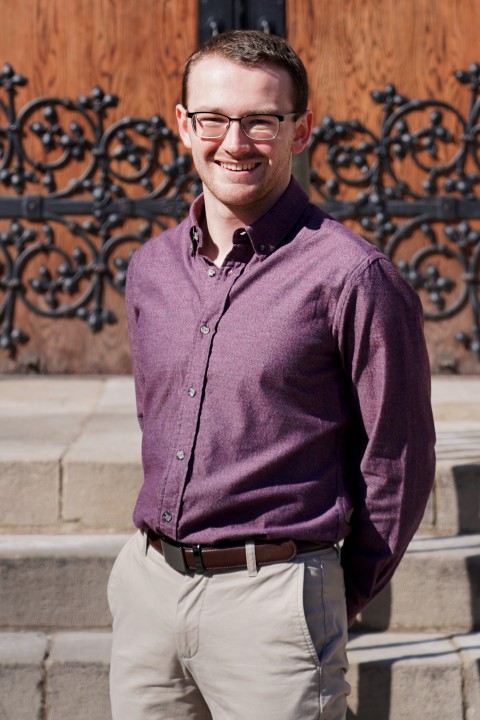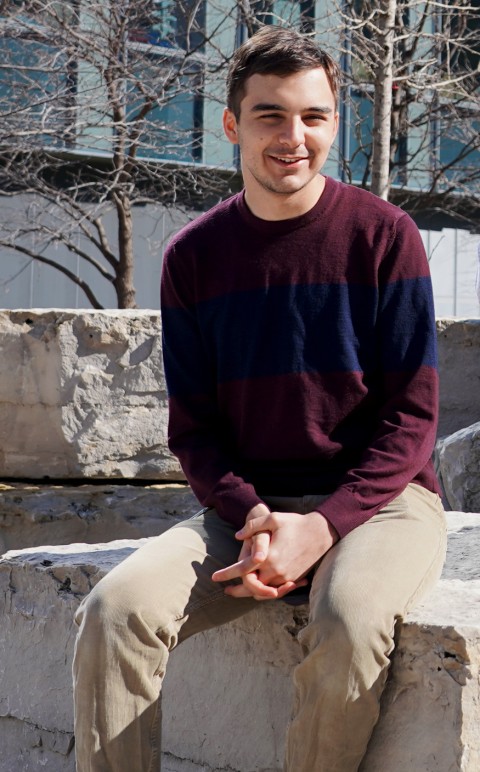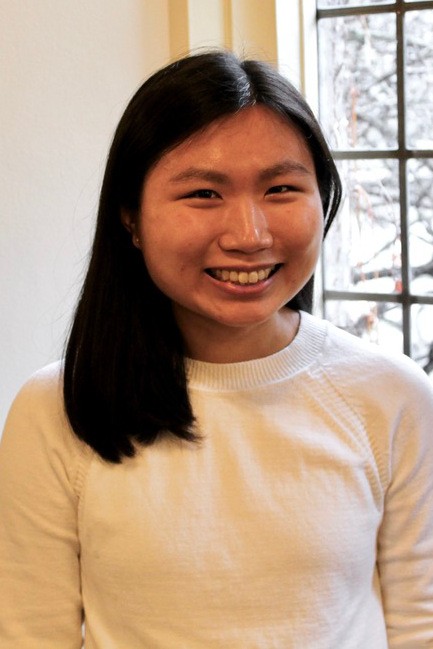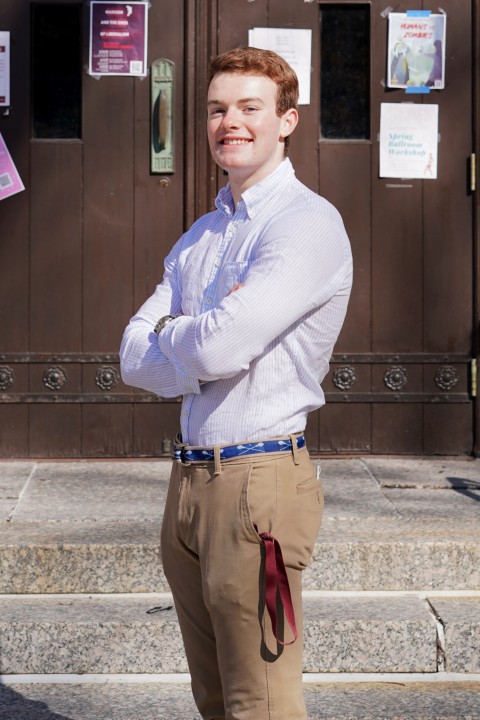Four University of Chicago undergraduate students have received Barry Goldwater Scholarships, awarded annually based on academic merit and undergraduate research in the natural sciences, mathematics and engineering.
Joseph Guter, Kameel Khabaz, Bernadette Miao and Wilson Turner are among the 417 U.S. college students to be selected for this award out of a pool of over 5,000 applicants. Considered the preeminent undergraduate award of its kind, the scholarship covers the cost of tuition, fees, books, and room and board up to $7,500 per year. It also helps STEM students fund their research during their final years of undergraduate study.
As third-year students in the College, Guter, Khabaz, Miao and Turner were supported throughout their Goldwater application process by the College Center for Research and Fellowships (CCRF) as well as by the UChicago Goldwater faculty nomination committee. CCRF supports undergraduates and recent College alumni through highly competitive national and international fellowships.
“The College’s commitment to funding undergraduate research, including travel to present at national conferences, helps forge a pathway for talented students to compete successfully for major scholarships like Goldwater,” said Nichole Fazio, associate dean of undergraduate research and scholars programs, and executive director of CCRF. “Thanks to the support of generous donors, our institutional leadership, and our faculty research mentors, we have established a strong pathway toward these national awards.”
Multidisciplinary immunology

Growing up in Great Falls, Montana, Joseph Guter was exposed to science at a young age. His parents often talked about their work as physicians at a local clinic, and left medical journals lying around the house.
His upbringing, and his first research experiences at the McLaughlin Research Institute in Great Falls in high school, had inspired him to study biology, but his plans changed after he began taking classes in the College. Groundbreaking research being done at the Pritzker School of Molecular Engineering and the Biological Sciences Division prompted Guter to pivot to a new focus: a molecular engineering major with a specialization minor in immunoengineering.
For the last year, Guter has worked as a research assistant in Assoc. Prof. Peter Savage’s lab, which focuses on immunology.
“I have been challenged to take on an ambitious and advanced research project but have also been given the training and support I need to do so with confidence,” Guter said. “Both socially and academically, I feel at home there, and my experiences have only made me more excited for life as a graduate student and researcher.”
Guter said an engineering background will enable him to effectively conduct research that bridges boundaries between immunology and other fields, and help him to conceptualize novel immunological ideas. Additionally, his engineering coursework will train him to think about design and how to translate fundamental immunology knowledge into clinical therapies.
Once he has completed his bachelor’s degree, Guter plans to continue his work in immunology by pursuing a Ph.D., focusing on the ways in which immune cells traffic throughout the body and interact with each other. Later in his career, he hopes to develop immunotherapies to treat cancer and autoimmune disorders, such as Type I diabetes and celiac disease..
Innovations in cardiovascular treatment

The son of Syrian immigrants, Kameel Khabaz spent his childhood summers visiting family in the city of Homs. He described those years as “blissful experiences” that immersed him in his family’s culture.
Unfortunately, they were later overshadowed by war and conflict, as Homs was a major rebel stronghold during the early years of Syria’s civil war. Khabaz said his family's proximity to the war inspired him to save lives through scientific research.
As a sophomore in high school, he contacted hundreds of university professors for a chance to pursue research. Those efforts gave him hands-on experience at the University of California, Irvine and the University of Southern California.
“Countless hours at the lab fostered my passion for science,” Khabaz said. “Research became my way of giving the world what was taken away from my home.”
Now majoring in biological sciences with a specialization in quantitative biology, Khabaz plans to spend his career creating innovative treatments for cardiovascular diseases.
Working with his mentor Luka Pocivavsek, an assistant professor of surgery at UChicago Medicine, has also convinced Khabaz to pursue an M.D.-Ph.D.
At the core of these endeavors, Khabaz said, is a desire to bring experts across disciplines together to devise new, impactful innovations that extend and improve lives.
“My enduring vision of changing people’s lives drives my lasting commitment to scientific research and its pursuit,” he said. “Rapidly bouncing between my American and Syrian identities has taught me how to connect different thoughts, people and ideas to create something new.”
Medicine at the molecular level

Bernadette Miao developed an appreciation for science thanks to a saltwater-powered toy car she experimented with in middle school. After activating the fuel cell and watching the car spurt forward, Miao became fascinated by the ability to convert chemical energy into movement.
Miao also developed an interest in compassionate service watching her mother, a retina surgeon, restore sight to her patients. These experiences in science and medicine, she said, sparked her love of learning and her desire to improve the lives of others.
Miao, who grew up in the Chicago suburbs after spending her childhood in Southern California, entered the College as a chemistry major, and was initially most interested in clean energy research. Her team won the MADD Scientist Award in the UChicago Futures Design Challenge and she further explored this interest through Metcalf internships at Alliance for the Great Lakes and the Virtual Green Energy & Sustainability Challenge.
She later added a second major in biological chemistry, inspired in part by her work with Prof. Bozhi Tian. As part of the Tian Research Group, she has focused on regenerative medicine and the use of nanoscience to approach medical disease from the molecular level. Miao has recently transitioned to Prof. Savas Tay’s Research Group to focus on intracellular protein sequencing to broaden her understanding of how to investigate biological systems.
Miao plans to pursue an M.D.-Ph.D. and work as a physician-scientist, combining her passions for patient care, the processes and pathways of disease and nano-based biomedical research.
“As a scientist, I will see disease as a challenge but, as a physician, I will view disease as a journey in which I hope to accompany and compassionately serve my patients,” she said. “I envision conducting basic science research by investigating disease at the molecular level but also more translatable research focused on developing therapeutics for diseases.”
Chemically engineered sustainability

Wilson Turner has long been fascinated by the natural world—“hooked” early, he said, by questions such as “why does ice float,” and the answers that scientific evidence could provide. He later gravitated towards chemistry because it seemed the most impactful and intuitive to him.
“Each and every day that I study this fascinating subject, it feels like I find something new to excite me,” he said.
Now a double major in molecular engineering and chemistry, the Baltimore native is interested in how chemistry research can drive innovation and new technologies to help protect the environment.
Turner’s first undergraduate chemistry research experience took place at UChicago’s James Franck Institute, where he studied the theoretical principles of ice formation and adhesion on surfaces. Last summer, he was selected as a DAAD-RISE and ACS-IRES scholar, which gave him funding to live and perform research in Germany.
As an Odyssey Scholar and advocate for the College’s first-generation and low-income student community, Turner said he is grateful for the help he has received from CCRF, which not only connected him to such transformative research and fellowship opportunities as Goldwater, but also removed any possible financial barriers.
“This award serves as a confidence booster to me that the work I'm doing is actually worthwhile,” Turner said. “But I would never be able to dedicate so much time and effort to research if it was purely on a volunteer basis. I am so lucky to have been supported by CCRF through their funding programs. This scholarship will only help make things a little easier on myself and my family.”
He currently works with Professor Stuart Rowan at the Pritzker School of Molecular Engineering, where he synthesizes interlocked polymer gels that have promising applications in environmental engineering and battery science.
After graduating from UChicago, Turner hopes to obtain a Ph.D. in chemical engineering and tackle issues in sustainability such as plastic upcycling, water filtration and atmospheric carbon capture. He would then like to work as a professor or continue his lifelong dream of becoming an astronaut.